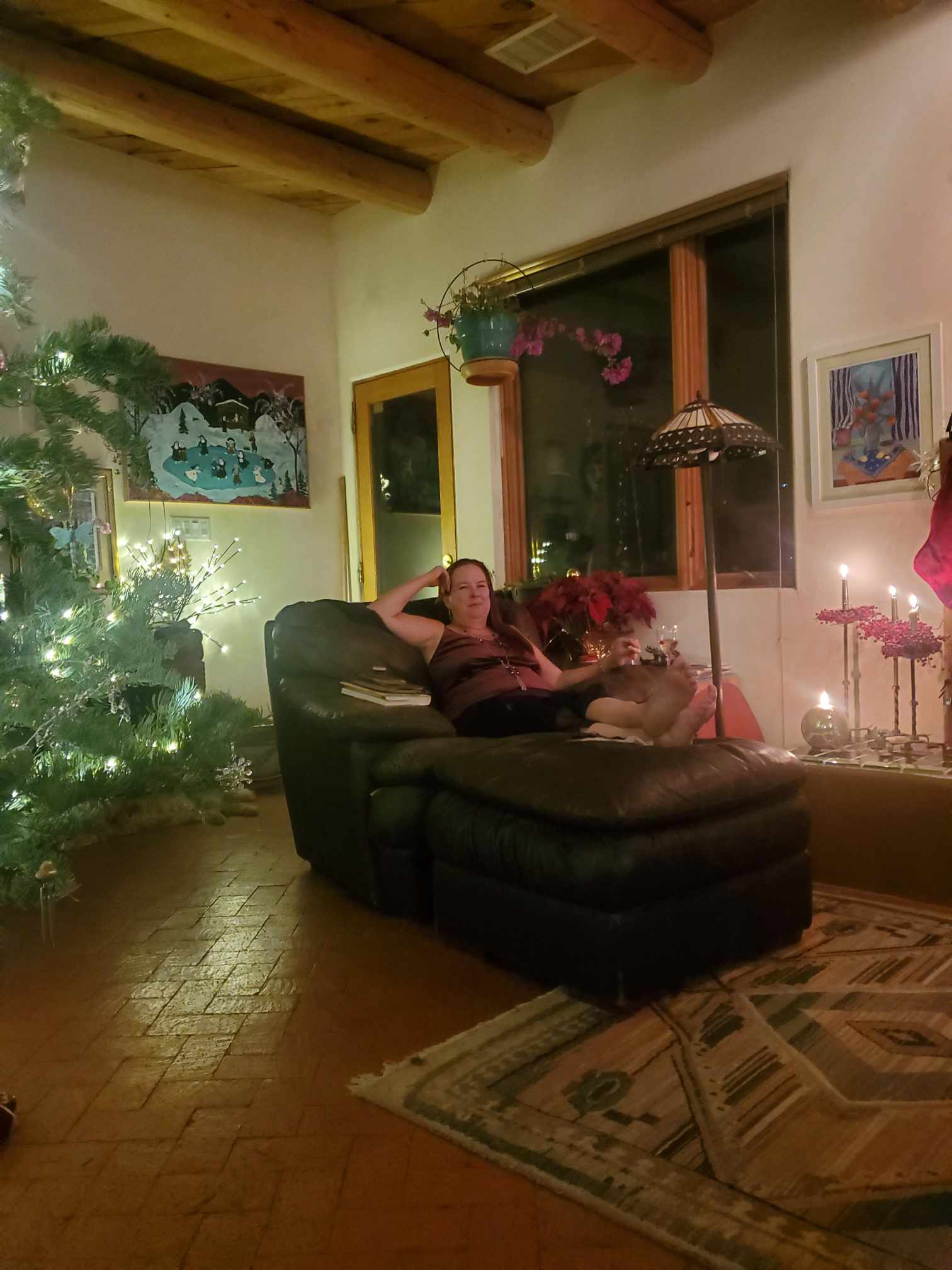This will be my last podcast…of 2024! I’m talking about a cool goal-setting trick, what I noticed about taking time off and aggressive well-refilling in general, feeling that creative impulse and looking to the year ahead.

RITA ® Award-Winning Author of Fantasy Romance

This will be my last podcast…of 2024! I’m talking about a cool goal-setting trick, what I noticed about taking time off and aggressive well-refilling in general, feeling that creative impulse and looking to the year ahead.





 I emerged from my office yesterday to happen upon this scene. Both cats were passed out, nearly nose-to-nose, amidst the detritus of cat toys. As one Facebook commenter pointed out, they look like they partied hard all night.
I emerged from my office yesterday to happen upon this scene. Both cats were passed out, nearly nose-to-nose, amidst the detritus of cat toys. As one Facebook commenter pointed out, they look like they partied hard all night.
Cats are admirable for their ability to relax. They can go from 60 to 0 in a blink. Wild rocket-cat to full-out, belly-up sprawl. There’s fascinating biology and animal behavior theories around this. Because felines are the most efficient predators out there, they have a lot of down time. They basically snooze so much because they can.
Wouldn’t that be nice, if we could be so super-productive with our time that we could spend the rest of it goofing off?
That’s part of the thrust of this fascinating article from Scientific American about why our brains physiologically require downtime. This bit, in particular, stood out for me:
Based on his own work and a thorough review of the relevant research, Ericsson has concluded that most people can engage in deliberate practice—which means pushing oneself beyond current limits—for only an hour without rest; that extremely talented people in many different disciplines—music, sports, writing—rarely practice more than four hours each day on average; and that many experts prefer to begin training early in the morning when mental and physical energy is readily available.
I also liked this:
Many recent studies have corroborated the idea that our mental resources are continuously depleted throughout the day and that various kinds of rest and downtime can both replenish those reserves and increase their volume.
and
By adulthood, most of us have adopted the habit of sleeping through the night and staying awake for most or all of the day—but this may not be ideal for our mental health and is certainly not the only way people have slept throughout history. In somewhat the same way that hobbits in Tolkien’s Middle Earth enjoy a first and second breakfast, people living without electricity in preindustrial Europe looked forward to a first and second sleep divided by about an hour of crepuscular activity. During that hour, they would pray, relieve themselves, smoke tobacco, have sex and even visit neighbors. Some researchers have proposed that people are also physiologically inclined to snooze during a 2 P.M. to 4 P.M. “nap zone”—or what some might call the afternoon slump—because the brain prefers to toggle between sleep and wake more than once a day. As far back as the first century B.C. the Romans regularly took midafternoon breaks, which they called meridiari from the Latin for midday. Under the influence of Roman Catholicism, noon became known as sexta (the sixth hour, according to their clocks), a time for rest and prayer. Eventually sexta morphed into siesta.
See, I tend to be the kind of person who works non-stop. I’m not much of a napper. I’ve always been blessed with good concentration – which is a handy skill for a novelist – but it means I can work for hours on end without noticing the passage of time. I’ll emerge from the trance utterly exhausted. And yes – it’s almost never more than four hours.
I rarely take this exhaustion seriously because, after all, I was only writing. Just thinking and keyboarding. It’s not like I was working four hours digging ditches.
But what all this research implies is that, energetically, it is the same.
So I love this concept of introducing deliberate mental downtime in my days. I think it’s so true that, as Americans, we get into this mode of working All The Time. For my day job, I work for a consulting firm much like the one cited in the article. During the recently ended government shutdown, we could not work on our projects – because our work is almost entirely for the EPA, which was deemed non-essential. I took leave and spent time on writing (of course), but it was fascinating to see so many of my colleagues not know what to do with themselves. I know of two gals who took vacation leave and went to work in the soup kitchen, just to feel productive. That’s great that they wanted to do it, but my first thought was, take vacation leave and go rest.
A lot of people in my company don’t use their vacation leave – and they’re proud to say so.
Thus, I’m working on freeing up my work habits and introducing deliberate rest time. It turns out that even closing my eyes for a few minutes should restore my mind. I also need to walk away from the computer more often – mini-breaks to switch up those energy-draining activities.
Oh and hey – it’s almost the weekend! Let’s all go do some restorative activities!

Yesterday, I did absolutely nothing.
And it was everything I thought it could be.
Actually, I don’t have a dream of doing nothing — but the line from Office Space feels inevitable. And if you don’t know what I’m talking about, you should drop everything you’re doing and go rent the movie right now. At any rate, I am generally a busy person. David says I am always busy. I’m willing to concede the point. I’m the person who, (AVATAR SPOILER ALERT) after the triumphant end of Avatar starts wondering what he’s going to *do* there now. Sure it was challenging and exciting when he had the steep learning curve and the conflict and all that. But, while tribal life looks so peaceful and bucolic, wouldn’t you get, well, bored after a while?
I think it mainly looks attractive to us because we are so busy.
And busy I have been. This new project I’ve been working on that’s so political involves countless meetings and hours of phone calls. Visiting and revisiting deadlines. Then I had another project that I had to deliver by midnight on December 31, which is not nearly as magical as it sounds. My colleague worked all week on it, when I wasn’t on other calls or going to meetings. She read over it while I took a shower at 6:30pm on New Years Eve and then I emailed it off. David and I made our 7:30 dinner reservation.
Normally, January 1 is a busy day for me. I come from Marie McGee’s School of How to Make Them Think You’re a Lady (Even If You’re Not) and one of the tenets written in stone is Thou Shalt Take Down Thy Christmas Decorations on New Years Day. Anything else TACKY. (Nothing is worse than “tacky” in Marie McGee’s world.) And normally I like that, starting the new year clean and fresh.
But you know, I just wasn’t feeling it yesterday.
I started this blog one year ago on January 1, so I had planned a bit of a year in review. Revisit the metrics. Discuss how it went. That sort of thing.
Wasn’t feeling that either.
I dragged myself out of bed at 9am, which is the longest I’ve slept in for quite a while. Though we did stay up until 1, which was also impressive. 9am is just the time the sun hits the big armchair on the west side of the living room. David brought me coffee. Then oatmeal. I sat in my nightgown and read.
When the sun moved off the chair, I spread a blanket on the floor, and followed the sun across the floor all day — until 4:17 pm, in fact — reading and gazing at the sky.
I watched the sunset. I took a bath and used all of my scrubs and lotions. We watched a movie and I went to bed at 10.
I did load the dishwasher before bed, but that was my lone concession to productivity.
I’ve never had a dream of doing nothing, but it truly was all I thought it could be.